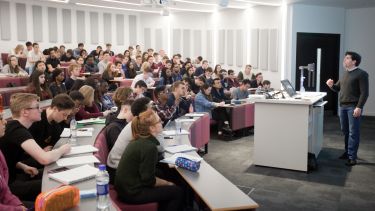Sustainability in our courses
Embedding sustainability across our teaching so every student can help shape the future.

Education is one of the most powerful tools we have for responding to the climate and nature crises. The ideas, skills and values developed at university will shape the decisions our graduates make as professionals, community members and citizens for decades to come. We want every Sheffield student – whatever their discipline – to understand how their subject connects to questions of climate justice, resource use, wellbeing and the future of society.
Education for sustainable development (ESD) is how we bring this to life in the curriculum. It is about asking difficult questions as well as finding solutions: who is affected, who benefits, what trade offs are involved, and how different kinds of knowledge can be brought together to address complex challenges. In practice, this might mean engineers thinking about social as well as technical systems, linguists exploring the role of language in environmental movements, or medics considering the health impacts of climate change.
We are working to ensure that sustainability is not confined to a handful of optional modules, but woven through the learning experience. This includes giving students chances to work on real world problems, to collaborate across disciplines, and to reflect critically on the role their subject plays in wider systems. It also means recognising that students bring their own experience and insight, and that learning about sustainability is a shared, two way process between staff and students.
The campus itself is part of this learning environment. Fieldwork, community projects, placements, volunteering and research opportunities all provide ways to explore sustainability in context – from local neighbourhoods and organisations to international partnerships. At the same time, we are mindful that these activities have their own environmental impact, and we are looking for ways to balance educational value with lower carbon ways of working and travelling.
Our aim is simple: that by the time they graduate, Sheffield students feel informed, empowered and equipped to contribute to the transition to a more sustainable, just and inclusive society, whatever career path they choose.
Targets and commitments
- Over the strategy period, increase student agreement with the statement “my course equips me to support sustainability” (measured through the TellUS survey) by:
- 20% in programmes currently scoring below 60%
- 10% in programmes scoring 60–85%
- maintaining or improving scores above 85%.
- Ensure that schools, through existing education governance structures, embed ESD within the core of all programmes by 2028, as evidenced by our digital curriculum management tools.
- Establish education for sustainable development as a standing item on all school and faculty student–staff committee agendas by 2026.
- Through our future estate and major campus developments, support the provision of outdoor teaching and learning spaces and a single device approach to student computing.
What does ESD mean for the University of Sheffield?
We're working to embed ESD into the Sheffield student experience, both within the formal curriculum and in the wider student experience while at Sheffield.
ESD has three elements:
- What we teach
Enabling our students to access the curriculum content they need to critically understand the key issues facing our world today:
- Understand the concept of sustainable development & its importance
- Demonstrate familiarity with the UN SDGs
- Use knowledge from their studies to discuss key issues in sustainable development, their challenges, and potential solutions
- Explain and explore the importance of the political, socio- cultural and economic context in which change happen
- How we teach
Offering our students the opportunity to learn in an applied, collaborative, participatory fashion:
- Explain and explore the importance of collaboration in knowledge creation, and the value of different forms of knowledge
- Translate the findings of their knowledge for different audiences and incorporate the input of different audiences into their work.
- Who we are
Helping our staff and students to play their part in a sustainable future through global empathy, solidarity, and a commitment to good change:
- Act in ways that positively contribute to sustainable development Understand the value of reflection, learning and change as a lifelong journey for individuals and institutions
- Help to create environments that are committed to collaboration, inclusivity, diversity, and equality
- Demonstrate a commitment to understanding socio-cultural, economic and political dynamics across the globe
- Demonstrate a capacity to exercise global empathy and solidarity.
Tracking our progress
The ESD Working Group is responsible for driving and tracking progress towards integrating ESD in our courses. It is made up of professional service and academic staff with responsibility for sustainability and curriculum-based decisions, along with student representatives. It includes senior representatives from relevant areas and reports to the Sustainability Steering Group, which in turn reports directly to the University Executive Board.
- Membership of the ESD Working Group
Name Role SJ Cooper-Knock Academic Lead for ESD Ali Riley Academic Develpment / Elevate Angela Hoare Academic Develpment / Elevate Helen Smith Associate Director of S&AS (Careers and Employability Services) James Merryclough Sustainability Programme Lead Lily Byrne Students' Union President Sustainability and Development Officer Students' Union Officer Education Officer Students' Union Officer Joanne Thompson Senior University Teacher - Clinical Medicine, School of Medicine and Population Health Lee Crookes University Teacher - Department of Urban Studies and Planning Rachael Rothman Academic Lead for Sustainability
Associate Director Grantham Centre for Sustainable FuturesHugo Dobson Faculty Director of One University Strategy Delivery (Social Sciences) Dorothea J Kleine Director of the Institute for Global Sustainable Development Caoimhe Nic Dhaibheid Director of Learning and Teaching Tim Herrick Senior Fellow of the Higher Education Academy Stephanie Butcher Lecturer in Global Sustainable Development Pete Mylon Faculty Co-ordinator for Co-Curricular Activities, iForge
The ESD Working Group reports on a quarterly basis to the Sustainability Steering Group, which reports bi-monthly to the University Executive Board.
